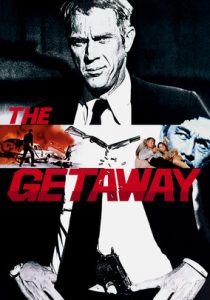The Getaway-1972
Director Sam Peckinpah
Starring Steve McQueen, Ali MacGraw
Top 250 Films #58
Scott’s Review #439
Reviewed July 3, 2016
Grade: A-
The Getaway (1972) is a classic action film by director Sam Peckinpah, known for works such as Straw Dogs and The Wild Bunch.
His films are known as “guy films” and are a rather violent experience. The Getaway is no exception, though it is not immensely brutal either. Still, there is more than one macabre scene and one dastardly villain.
For fans of Peckinpah, The Getaway is a must-see.
The film features Steve McQueen and Ali MacGraw, who are perfectly cast as lovers Doc and Carol McCoy. Inescapable was their chemistry, and art mirrored life as the two were embroiled in a torrid love affair during the shooting, and later, they were married.
We meet Doc in a Texas prison, where his parole has just been denied. Doc and Carol decide to make a deal with corrupt businessman Jack Benyon to ensure Doc’s release. One stipulation is for Doc to participate in a bank heist with two of Jack’s men (Rudy and Frank).
The heist goes off, but things go awry, and Doc and Carol head for El Paso with a large sum of money, being pursued by Rudy and a double-cross attempt by Jack.
Rudy kidnaps veterinarian Harold and his young wife Fran (Sally Struthers) to aid him with his injuries, taking them along as he pursues Doc and Carol.
Mixed in with the already complicated plot is a con man who attempts to steal Doc and Carol’s money.
Doc and Carol are clearly the heroes of the film and are meant to be rooted for, and the characters work very well together. Yes, they are criminals themselves, but they are portrayed as nice and not hurting anyone who does not deserve it. Doc does spare Rudy’s life at one point, and I think this only reinforces his appealing anti-hero character.
The love story is also a significant aspect of the filmmaking, making Doc and Carol likable. A few sweet, tender scenes of their romance are mixed in, adding a nice balance to the otherwise testosterone-fueled events.
The Getaway features spectacular editing, particularly at the beginning of the film, where we watch Doc in prison, going through his day-to-day rituals, which are seamlessly interwoven with other stories in the movie.
The musical score matches perfectly with the editing, adding a provocative element of intrigue. These components add the necessary elements to a film like this- edge-of-your-seat!
I love the Texas setting.
Characters are constantly traveling to get somewhere- either by train, by car, or on foot- so we see much of the Texas countryside, almost giving The Getaway a Western flavor.
It is certainly a hot and humid environment, though McQueen always has a sophisticated suit on and MacGraw looks stylish and put together.
And from a prop perspective, I never tire of seeing those early 1970s sedans driving at high speeds.
Unfortunately, as with most Peckinpah films, women are not portrayed in a positive light, though Carol is one of the strongest of his female film characters. Yet, in one tough scene, she is smacked around by Doc after he realizes she slept with Jack to ensure his release from prison.
The most confusing and weak character is Fran. In a strange bit of writing, she inexplicably falls madly in love with her kidnapper, Rudy, even as he abuses and humiliates her- while her husband is around. This is odd and tough to watch and not the best part of The Getaway.
Her character is not developed well and it is head-shaking why she feels any passion for Rudy.
The heart of the film belongs to Doc and Carol as they are on the lam for much of the time and this is a successful part of The Getaway- hence the title. Will they get caught, will they escape?
The characters remind me of Bonnie and Clyde, so we wonder if Doc and Carol will meet the same fate, but of course, we like them so we do not want that.
The Getaway is a fast-paced, down-home, red-blooded sort of action film. It is stylized, gritty, and sometimes violent. The chicken wing scene between Rudy, Fran, and Harold starts light and turns ugly, adding to the unpredictable nature of the film.
A supreme offering by Peckinpah.

